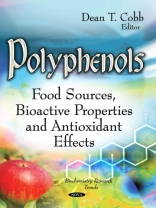Polyphenols are secondary metabolites of plants. Dietary phenolics are not only classified as human nutrients, but also play important roles in human health and are therefore called nutraceuticals. Both epidemiological studies and controlled human studies have shown that regular intakes of diets rich in phenolics are inversely related to some chronic diseases such as certain cancers and coronary heart diseases. Types and contents of phenolics in different food system vary greatly and foods of plant origin including fruits, vegetables, legumes and some beverages are good sources of bioactive phenolics. Beside the edible part of plant foods, some agricultural by-products usually contain higher levels of polyphenols, particularly, flavonoids than products themselves. This book describes the major classes of dietary phenolics, and their occurrence in the commercially important agricultural by-products including peanuts skin, grape pomace, apples pomace, citrus processing by-products, and cranberry pomace. It also discusses the role of polyphenols in the prevention of ultraviolet light induced inflammation and immunosuppression; yerba mate; the Mediterranean diet; industrial apple pomace; the role of polyphenols in human diseases; and the influence of extraction methods on the stability of polyphenols.
Dean T Cobb
Polyphenols [PDF ebook]
Food Sources, Bioactive Properties and Antioxidant Effects
Polyphenols [PDF ebook]
Food Sources, Bioactive Properties and Antioxidant Effects
Acquista questo ebook e ricevine 1 in più GRATIS!
Formato PDF ● Pagine 290 ● ISBN 9781631178580 ● Editore Dean T Cobb ● Casa editrice Nova Science Publishers ● Pubblicato 2017 ● Scaricabile 3 volte ● Moneta EUR ● ID 7224424 ● Protezione dalla copia Adobe DRM
Richiede un lettore di ebook compatibile con DRM












